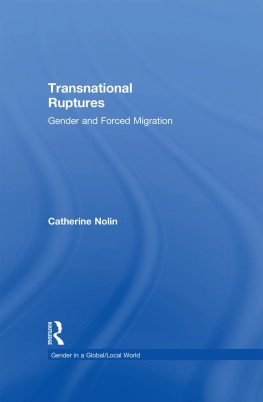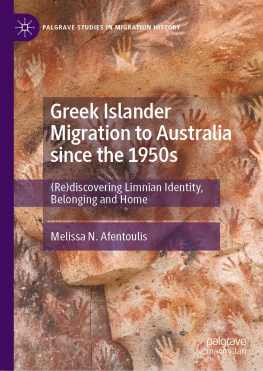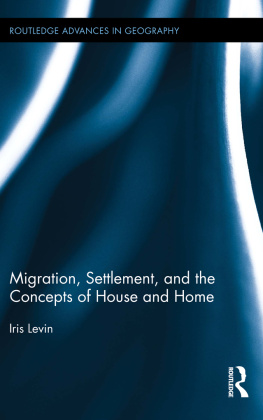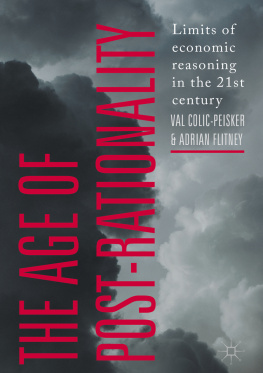Migration, Class,
and Transnational Identities
STUDIES OF WORLD MIGRATIONS
Donna R. Gabaccia
and Leslie Page Moch, editors
A list of books in the series
appears at the end of the book.
Migration, Class, and Transnational Identities
Croatians in Australia and America
VAL COLIC-PEISKER
UNIVERSITY OF ILLINOIS PRESS
Urbana and Chicago
2008 by Val Colic-Peisker
All rights reserved
Manufactured in the United States of America
c 5 4 3 2 1

This book is printed on acid-free paper.
Library of Congress Cataloging-in-Publication Data
Colic-Peisker, Val.
Migration, class, and transnational identities :
Croatians in Australia and America /
Val Colic-Peisker.
p. cm. (Studies of world migrations)
Includes bibliographical references and index.
ISBN 978-0-252-03360-5 (cloth : alk. paper)
1. CroatsAustraliaSocial conditions.
2. Croatian AmericansSocial conditions.
3. ImmigrantsAustraliaSocial conditions.
4. ImmigrantsUnited StatesSocial conditions.
5. CroatsAustraliaEthnic identity.
6. Croatian AmericansEthnic identity.
7. Transnationalism.
8. GlobalizationSocial aspects.
9. AustraliaEthnic relations.
10. United StatesEthnic relations.
I. Title.
DU 122.C7.C645 2009
305.89183073dc22 2008021782
Contents
Series Preface
Donna R. Gabaccia and Leslie Page Moch
Tables and Figures
TABLES
FIGURES
Series Preface
DONNA R. GABACCIA
AND LESLIE PAGE MOCH
Migration, Class, and Transnational Identities is the third volume in the Studies of World Migrations series, following Leo Lucassens Immigrant Threat: The Integration of Old and New Migrants in Western Europe since 1850 and Nancy Green and Franois Weils edited collection Citizenship and Those Who Leave: The Politics of Emigration and Expatriation. It is the first contribution to the series written by a sociologist and it is an excellent example of how interdisciplinary the field of migration studies is becoming. Although Migration, Class, and Transnational Identities focuses on a little-known and relatively small migration from the Balkans to Australia, it is concerned with issues that are vitally important and interesting to the large group of social scientists and historians studying the transformation of migration streams as they respond to world historical changes such as the collapse of the communist societies and economies of southeastern Europe.
Migration, Class, and Transnational Identities insists that class analysis needs to be at the center of our understanding of transnational migration and transnational ways of life. But this is no labor history of working-class mobilization. It is a finely crafted case study of real people and how class has shaped their lives across national boundaries and across time. Working as an ethnographer who is thoroughly familiar with the rural/urban divide in Croatia (when it was still part of Yugoslavia), Val Colic-Peisker traces the transnational ties, emerging ethnic identities, and life stories of the blue-collar workers who first ventured to far-off Australia in the 1950s and 1960s. A shared national origin or history gives these migrants little in common with the postcommunist intellectuals, professionals, and technical workers who have sought new economic opportunities in Australia during the 1990s; these newcomers think of themselves as cosmopolitans relatively unburdened by particularist identities as they seek to build professional careers wherever opportunity beckons.
How much do national or ethnic Croatian identities matter for these two groups of migrants? How do the two groups position themselves in relationship to their old home in Europe and their new home in Australia? To each other? Few readers of Val Colic-Peiskers work will doubt the continued salience of class in our own supposedly postmodern and postindustrial world.
Acknowledgments
This book is an outcome of several years of research conducted in Australia and Croatia and driven by a combination of personal and scholarly interest in migration and transnationalism. My greatest thanks go to my respondents, who generously gave their time and narrated their migration experiences with passion, humor, and a great sense of detail. I want to emphasize how much I appreciate their accounts as personal experiences, because clustering people in groups and analyzing them sociologically inevitably depersonalizes individual experiences, which are, on a deeper level, unique and incomparable and always stick out of the conceptual boxes created for them by social scientists. My special thanks go to Mr. Josip Grgurich and Mrs. Domena Grgurich, who made available their old photographs and press clippings, and to Mr. Marinko Boikovi, Mr. Jure Kovacevich, and Mrs. Jela Marenko, who gave permission to use their personal photographs. I would also like to thank Murdoch University for continuing support throughout my doctoral candidature, postdoctoral fellowship, and beyond, and my colleagues from Murdoch University and University of Western Australia, many of whom are members of the Western Australian Migration Research Network, for providing an intellectual forum where my ideas were presented, challenged, and polished. I am also indebted to Professor Emeritus Cora Baldock, who was an excellentcritical but constructivesupervisor of my initial doctoral project on which this book is based, and anonymous readers whose insightful comments and suggestions helped shape this book into its present form. My warm gratitude goes to Professor Donna Gabaccia and Professor Leslie Moch, external editors of the World Migration series at the University of Illinois Press, for their encouragement throughout the long process of publication; an extra thanks to Donna who was always quick and thorough in answering my e-mails. I also thank Ms. Joan Catapano, editor-in-chief of the University of Illinois Press, for deciding to publish this book. Ms. Breanne Ertmer was extremely helpful in the last stage of manuscript submission and patiently answered my many queries. Ms. Angela Burton and Mr. Drew Bryan were equally helpful at the editing stage.
Closer to home, I thank Mr. Rob Finlayson for being an excellent, reliable, and patient proofreader during several rounds of finalizing the manuscript. Finally, I thank my son Andrej for being my anchor to reality and life beyond scholarly pursuits, and for keeping my daily sittings in front of the computer down to a not-too-unreasonable number of hours.
The imperfections that inevitably mark every human endeavor, however passionately pursued, and therefore also this book, are fully my own responsibility.
Migration, Class,
and Transnational Identities
Introduction
Her children were concerned about her ability to cope independently because she was becoming a little forgetful, her son explained. The four of us sat around Maras kitchen table and the psychiatric nurse was going through his usual schedule. What was the month, the year, the day of the week, the season? When was she born? With slight hesitation and at a pace appropriate to her age, Mara answered all the questions correctly. Toward the end of the interview she was asked to write down a sentence, whatever first comes to her mind. A pensive look appeared on her face for a brief moment and then she wrote,







 This book is printed on acid-free paper.
This book is printed on acid-free paper.